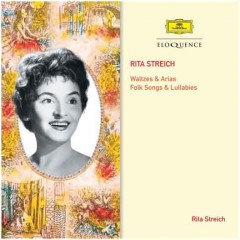
‘Rita Streich, famed for her peerless coloratura, for her Queen of the Night and her performances of Olympia in Les contes d’Hoffmann and Blonde in Die Entführung aus dem Serail; Rita Streich, often dubbed a ‘singing nightingale’ also took time out from a busy career to record miniatures. Several LPs, combined over two (now deleted) Deutsche Grammophon ‘Originals’ are here combined into a 2CD set, showcasing the soprano in popular opera-arias, waltz-songs, folk-songs (English, American, Russian, Japanese and Yiddish) and lullabies. The waltzes stem from the melodic treasury of the Viennese Strauss dynasty – music of yearning, enchantment and nostalgia, all abetted by Streich’s joyous coloratura. The folk songs and lullabies were recorded in Munich and in Regensburg, in 1962 and 1964. Note-writer Bernhard Uske, describes the result as ‘a glorious carpet of flowers’.
CD 1
WALTZES & ARIAS
JOHANN STRAUSS
1 Frühlingsstimmen, Op. 410 (Voices of Spring)
CAMILLE SAINT-SAËNS
2 Le rossignol et la rose (The Nightingale and the Rose)
GIUSEPPE VERDI
3 Lo spazzacamino (The Chimney Sweep)
BENJAMIN GODARD
4 Cachés dans cet asile, où Dieu nous a conduits … Oh, ne t’éveille pas encore (Berceuse, from Jocelyn)
LUIGI ARDITI
5 Parla-Walzer: ‘Qui nel dubbio non farmi penare’
FRANZ VON SUPPÉ
6 Hab’ ich nur deine Liebe, die Treue brauch’ ich nicht (from Boccaccio)
ANTONÍN DVOŘÁK
7 Měsíčku na nebi hlubokém (Song to the Moon, from Rusalka)
GIACOMO MEYERBEER
8 Ombra leggera (Shadow song, from Dinorah)
Radio-Symphonie-Orchester Berlin
Kurt Gaebel
JOSEF STRAUSS
9 Dorfschwalben aus Österreich, Op. 164 (Village Swallows from Austria)
ALEXANDER ALABIEV
10 Solovey (The Nightingale) (Russian folk song)
LÉO DELIBES
11 Les filles de Cadiz (The Maids of Cadiz)
WILLY CZERNIK
12 Chi sa?
SALVATORE MARCHESI
13 La folletta
FREIDRICH VON FLOTOW
14 The Last Rose of Summer (from Martha)
EVA DELL’ACQUA
15 Villanelle
JOHANN STRAUSS
16 Draussen in Sievering
LUIGI ARDITI
17 Il bacio
RIAS Symphony Orchestra Berlin
Kurt Gaebel
CD 2
FOLK SONGS & LULLABIES
1 Du, du liegst mir im Herzen
(North German folk song)
2 O du liabs Ängeli
(Swiss folk song)
3 Frère Jacques
(French folk song)
4 L’Amour de moi
(Olf French folk song)
5 Canto delle risaiole
(Italian folk song)
6 Z’Lauterbach hab i mei Strumpf verlor’n
(German folk song)
7 Schlof sche, mein Vögele
(Jewish lullaby)
8 Drink to me only with thine eyes
(English folk song)
9 Nobody knows the trouble I’ve seen
(Negro spiritual)
10 Sakura – Sakura (Cherry Blossoms) (Japanese song)
(Japanese song)
11 Tschubtschik
(Russian dance-song)
12 Spi mladenez
(Russian lullaby)
13 In mezo al mar
(Folk song from Trieste)
14 Wenn ich ein Vöglein wär
(German folk song)
15 Der Mond ist aufgegangen
(German folk song; music: Johann Abraham Peter Schultz; text: Matthias Claudius)
16 Muß i denn zum Städtele ’naus
(German folk song)
Instrumental-Vereinigung
Singgemeinschaft Rudolf Lamy
Eugen Cymbalisty, masterchorus
(1–6, 8, 10, 11, 13, 15, 16)
Hedwig Bilgram, harpsichord (4, 7)
Fred Artmeier, guitar (7, 11, 13)
Carl Michalski
17 Weißt Du, wieviel Sterne stehen
(German folk song, from Des Knaben Wunderhorn)
18 O wie wohl ist mir am Abend
19 Wo e kleins Hüttle steht
(Swabian folk song)
20 All mein Gedanken
(German folk song from Lochamer Liederbuch)
21 Glockenruf
(German folk song)
22 Der Bürgermeister von Wesel
(Folk song from the Lower Rhineland)
23 Der Wechsel der Jahreszeiten
(German folk song; composer: Philipp Julius Lieberkühn)
24 Schlaf, Herzenssöhnchen
(German lullaby; composer: Carl Maria von Weber; text: F.C. Hiemer)
25 Schalfe, mein Prinzchen, schlaf ein
(German folk song; music: Bernhard Fliess; text: F.W. Gotter)
26 Sandmännchen
(German lullaby; composer: Anton Wilhelm von Zuccalmaglio, after ‘Zu Bethlehem geboren’)
27 Der Kuckuck
(Westphalian folk song)
28 Schwesterlein
(German folk song; composer: Anton Wilhelm von Zuccalmaglio, after ‘Brüderchen, ach Brüderchen’)
29 Ach Modr, ick will en Ding han
(Folk song from the Rhineland)
30 In der Fruah
(Folk song from Upper Styria)
31 Abendlied
(German folk song)
32 Ave Maria, KV 554
(Canon; composer: Wolfgang Amadeus Mozart)
Members of the Bavarian Radio Orchestra
(17, 19–26, 28–31)
Regensburger Domspatzen
(18, 21, 22, 27, 31, 32)
Kurt Gaebel
Rita Streich, soprano
Executive Producer: Prof. Elsa Schiller
Recording Producers: Klaus Fischer-Dieskau (CD1: 1–8); Wolfgang Lohse (CD1: 9–17); Otto-Ernst Wohlert (CD2)
Recording Engineers: Harald Baudis (CD 1); Joachim Augustin (CD2: 1–16); Günter Dieckmann (CD2: 17–32)
Recording Locations: Jesus-Christus-Kirche, Berlin, Germany, February 1955 (CD1: 9–17), May 1958 (CD1: 1-8); Hochschul-Saal, Munich, Germany, July 1962 (CD2: 1–16); Antonius-Saal, Regensburg, Germany, July 1964 (CD2: 17–32)
‘she has the rare gift of being able to sing bon-bons with a complete and captivating charm … sparkling fireworks (Meyerbeer) … the most beautiful control (Saint-Saëns) … ravishingly spun tone (Godard) … the recording is outstandingly good throughout with plenty of depth and a pleasing acoustic’ (CD1: 1–8) Stereo Record Guide
‘like a bird on the wing, crystal-clear, astounding in its virtuosity … sings with absolute naturalness, with the utmost ease and a completely unforced intimacy’ Opéra International
‘a voice so bright that an inner light radiates in her singing, Streich is pure pleasure to listen to … Highly recommended’ (Folk Songs and Lullabies) Fanfare
‘Her voice was absolutely faultless: a ravishingly beautiful and pure tone, produced with perfect breath support and absolute evenness from bottom to top, with dead-on intonation and completely secure high notes free from any shrillness. This was allied to an interpretive art that was vivacious and yet always in perfectly good taste, able to pull out the stops for effect without falling prey to vulgarity’ (Waltzes & Arias) Fanfare
